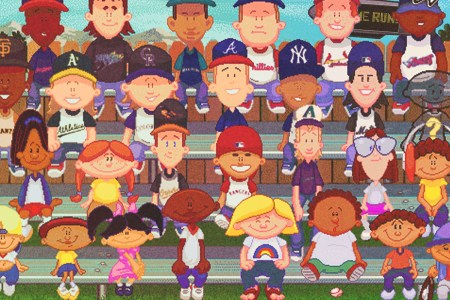“I knew I had a problem,” Scott admits. “The amount of time I was spending on it just kept increasing and I couldn't imagine quitting. I recognized all the signs of an addict and knew I had to do something.”
Scott wasn't addicted to alcohol or drugs, but he was addicted to video games, spending every minute he had in front of a screen. “Gaming allowed me to escape reality. It made all my stress go away,” explains Scott, a spokesman for Game Addicts Anonymous, which was founded in 2014 and has seen a steady rise in demand for its counselling services.
“Playing with other people made me feel like I was accomplishing something in a way that I probably couldn’t on my own. [in the real world]”I tried putting timers on my games, cutting out entire genres of games,” he says. Still, nothing worked. “I thought I could moderate my usage, but I couldn't. The only solution for me was to abstain completely. It was very hard at first. It took me probably a year to get used to it. Now I focus on other things in my life, like exercise and sleep.”
“I still play games,” he added. “Board games.”
According to numerous anecdotes, Scott is not alone. And his case is not particularly extreme. He talks of distraught parents calling him, threatening to stop eating or refusing to go to school if he cuts back on his gaming time, and older gamers unable to keep their jobs. While gaming may be associated with teenagers (most gamers are boys, and one statistic suggests they play an average of two hours and 19 minutes a day), the average age of a gamer in the U.S. is actually 33. Through his work, Scott regularly hears their stories of aggression, anxiety, depression, insomnia, and hypervigilance.
The rise of internet gaming disorder
These stories are examples of what psychologists are now calling Internet gaming disorder (IGD). The World Health Organization has classified “video game addiction” as a mental illness, and in 2022 the American Psychiatric Association's bible of mental disorders, the DSM-5-TR, added the same classification.
The definition of the disorder includes obsession with gaming, tolerance build-up, withdrawal symptoms, lying about gaming, loss of interest in other activities, and loss of interest in relationships, school, or work. Some countries, such as the UK and South Korea, now have specialist centres dedicated to treatment.

What is Addiction?
“Does gaming addiction exist? Yes. But video games Addictive “That's a completely separate issue,” says Dr Mark Griffiths, one of the most published researchers in the field of gaming-related disorders and director of the International Games Research Unit at Nottingham Trent University.
As evidence of how new the study is, Dr Griffiths has been criticised both for loosening the criteria for determining gaming addiction and for setting them too strict.
“I'm not anti-gaming,” Griffiths adds. “I play and I get my kids to play, but I think there's a very small minority of players who see the value in gaming. [negative] “It doesn't affect their lives and they are functioning. They may have problems but they're clearly not addicted. What did I do when I was these kids' age? I watched four to five hours of black-and-white TV every day.”
The nature and extent of gaming's “addictiveness” remains unclear and contradictory. It's unclear whether games cause problems allegedly caused by excessive gameplay (ADHD, autism, depression, etc.), or whether people with such problems are drawn to games. “It's like photosensitivity,” Griffiths suggests. “Gaming can cause epilepsy, but it doesn't cause epilepsy.”
When the game is life
At the same time, modern games are designed to be more immersive than any previous form of mass entertainment. As Scott argues, games are now immersive, can be played 24/7, and have a realistic quality, personalization of avatars, and a platform for connection with other people that mutually reinforces your desire to play. The reward mechanisms built into many games cleverly activate dopamine release in the brain, catching players in a grip and not letting go. To make matters worse, the games that do this best are also the ones that most often cause problems for players.
Dr Angelica Ortiz de Gortari, a psychologist and lead researcher in eSports at the University of Bergen in Norway and co-developer, along with Griffiths, of the concept of game transference – when excessive gameplay shapes our perception of real life – points to “problematic gaming”, when people play video games to compensate for a lack of positive life experiences.
She emphasizes that certain individuals are more likely to have problems with video games and may also have underlying mental health conditions such as anxiety or depression. A 2017 study found that IGD may affect 0.3% to 1% of Americans, which is less than the rate for alcohol or drug abuse disorders.
But Griffiths is sceptical of these figures.[Even if] “If the rates of gaming disorder were accurate, there would be specialist clinics in every big city in every country, but clearly they aren't,” he says. “I don't think gaming addiction is as prevalent here as it is in many other countries.” [scientific] According to the literature.
“Comorbidities [when someone has more than one condition at the same time] “The prevalence of gaming disorder encapsulates the controversy over considering it a primary disorder,” says Ortiz de Gortari. “Current concepts of gaming disorder may be centered around excessive gaming and the negative consequences that result from it, but there is still a lack of understanding about the specific characteristics of gaming disorder. game And the real impact it produces.”
In fact, there's another side to gaming that doesn't get as much coverage: studies have shown that playing video games can cause physical side effects, such as eye strain, repetitive strain injuries, “Nintendoitis,” and motion sickness. Like anything sedentary, gaming isn't great for your health, and time spent gaming correlates with higher BMI, lack of sleep, and excess caffeine and calorie intake. In other words, too much gaming can make you fat, nervous, and tired.
But are there no cognitive benefits?
At the same time, recent studies (some using fMRI scans to compare gamers and non-gamers) have shown that gaming has many positive mental health effects. These include increased awareness and reaction time, improved working memory, and increased cognitive activity. Areas of the brain associated with attention have been found to be more efficient in gamers than non-gamers. Some studies even suggest that gamers exhibit relatively higher IQs. This could be a result of the faster information processing that many games require from players, but it could also be because that processing speed is necessary to enjoy games in the first place.
“When a gamer plays a game for 10,000 hours, they not only become an expert at that game, but also at many other things: problem solving, strategy, tactics, planning, communication, negotiation, team building and team management, goal achievement, and they do all of this with a certain energy and optimism,” enthuses David Mullich, principal video game designer at Apple and Activision, and the first video game producer appointed by Disney. “All of these qualities could, over time, be leveraged for powerful social uses for games.”
It's not yet clear whether this kind of brain training will translate to the real world, but it's not surprising that neurologist Steven Novella has suggested that specially designed video games should at least be explored as potential teaching aids in schools.

Social security too
Other benefits have also been identified. Most notable among recent studies is a 2022 study by the Oxford Internet Institute, a groundbreaking report that leverages hard data provided by game companies and does not rely on player self-reporting, as previous studies have typically and problematically done. It concludes that games can improve well-being through feelings of autonomy, relatedness, competence, and the straightforward enjoyment they encourage.
Perhaps the social connection that gaming provides is its defining benefit, despite the assumption that excessive screen time will force players into anti-social bubbles. “Some players actually don't care that much about gaming per se,” says Nick Barrow, a postdoctoral researcher and one of the study's authors. “For them, gaming is an important form of stress relief, [what psychologists call] “Mood stability”
Surprisingly, this is the first study of its kind, and it's only in recent years that game developers have realized the value of large-scale data collection. But there has been some hesitation. [in the gaming industry to work with academia]“I think the industry is worried. [about being deliberately misrepresented] “Also, developers are wary due to past experiences where media coverage has hurt their revenue. It's difficult for developers to allow researchers to be independent and go where the data leads.”
Video games and slander
And there's been a long history of media hysteria about the dangers of video games. There's no proven causal link between violent video games and high school shootings. “There's a long history of new media getting a bad rap — panics about rock music and Dungeons & Dragons,” says Dr. Richard Strong, assistant deputy director of the Strong National Museum of Play in New York. American Journal of Play“I think the reason we’re seeing a backlash is because people haven’t yet fully understood the implications of new media and the bigger, more mature media. [over recent years]. “
“There is a lot of misinformation about the effects of video games, especially the negative ones, because there are so many different titles with different content and gameplay, and unfortunately the media prioritizes stories with scathing negative headlines,” Ortiz de Gortari agrees. Still, he hopes that game developers will warn about the potential effects of their games during and after play. “Research into the effects of video games is still in its early stages, and government agencies must provide information and enforcement policies on social responsibility.”
What was the verdict?
The research needed to better understand what's going on here can't be done fast enough. In short, we don't know for sure whether too much gaming is definitely bad for you, good for you, only bad or good for a minority, or all of the above.
This situation is further complicated by the fact that while some are trying to build lucrative new markets for treatment, screen-based technologies are primarily – and increasingly not only – driven by younger generations. Are we pathologizing behaviors that have become the new normal?
“That's why we're not about abstinence. management“We're seeing a lot of young people becoming addicted to social media feeds and games consoles, if not completely addicted,” says Dr Mike Bishop, a psychologist and founder of Summerland Camp, which runs a program in the US to change the technology habits of young people aged 12 to 21. [these children and young adults] They need a reason to manage their technology use and be aware of how much time it is taking up when other priorities should be a priority. Are they seriously planning on being a pro gamer or should they be planning on going to college?”
“As long as games fulfill the needs they fulfill – socialization, anxiety reduction, feeling like you can do something well – the withdrawal symptoms you see in most kids are minimal,” he added. “But there are extreme cases where kids just go blank-out. I truly believe that in 20 years, we'll look back on this like we look at cigarette ads from the 1930s, and be surprised that we didn't restrict our kids' access to these devices.”
Whether you want to get in shape or simply feel better; Fee have you We've got you covered. Sign up for our new Wellness Newsletter today!


